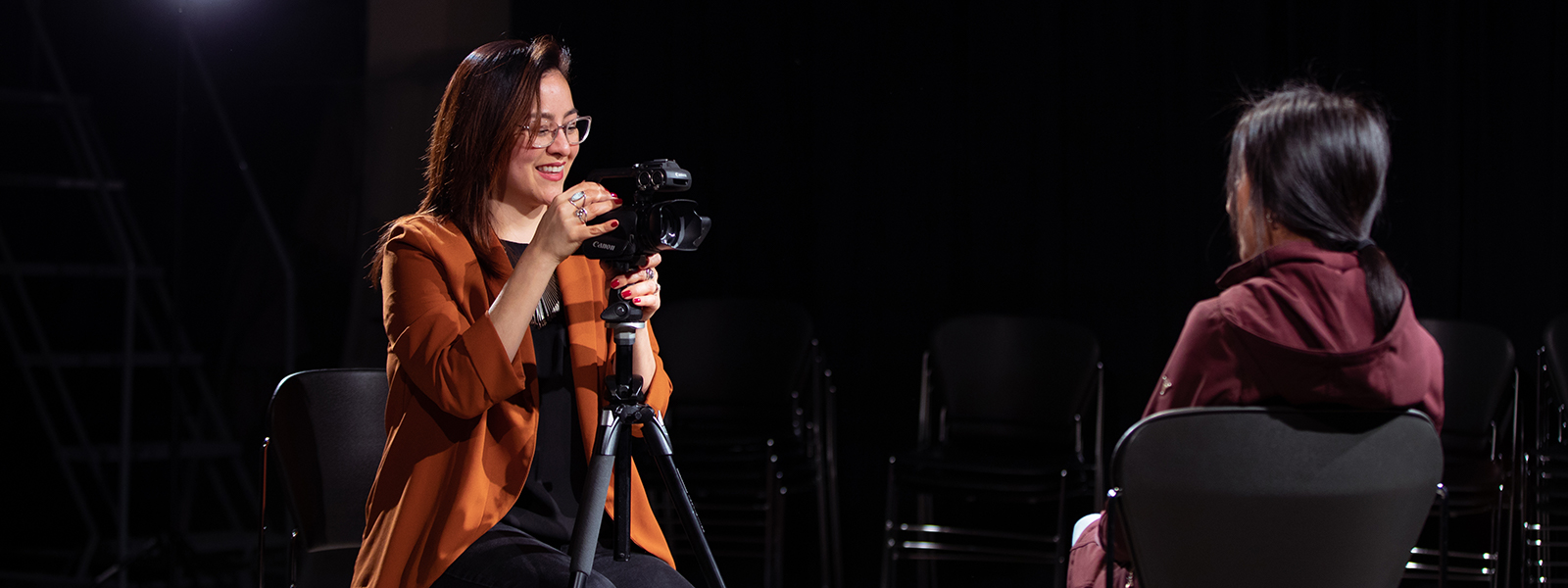
Focusing on Activism
Assistant Professor Sonia De La Cruz uses documentary filmmaking to address social justice and human rights issues.
This Section's arrow_downward Theme Info Is:
- Background Image: ""
- Theme: "light-theme"
- Header Style: "purple_dominant"
- Card Height Setting: "consistent_row_height"
- Section Parallax: "0"
- Section Parallax Height: ""
Storytelling is important to Assistant Professor Sonia De La Cruz. Born in the United States but raised in Mexico, De La Cruz’s experience of navigating life between two countries shaped the way she sees the world and informs both her scholarship and documentary work. “I have family in both the United States and Mexico,” she said. “This has given me the opportunity to experience two different cultures and learn about different social and cultural values and expectations.”
De La Cruz comes from a working class family. “My mom was a stay-at-home mom and my dad was a cab driver who didn’t have the opportunity to go to college,” she said. “Both of my parents, but especially my mother, always encouraged my brother and I to go to school.”
While in high school, De La Cruz interned at Televisa, the largest mass media company in Mexico at the time. “I started as a production assistant and just tried to learn everything from writing scripts to editing different program segments,” she said. Later, she was offered a job at the television station and worked there for a couple of years before deciding to attend college.
De La Cruz opted to study in the United States. “Many of the good colleges in Mexico were privatized and were quite expensive. That was something I could not afford since I had to work to pay for my own education,” she said. De La Cruz enrolled at San Francisco State University where she majored in broadcast and electronic communication arts.
While still in school, De La Cruz took a part-time job at a local office of the Teamsters Union. “They needed someone who was bilingual and the work would allow me to pay for my education,” she said. De La Cruz got more than just a paycheck from the job. “I learned about the value of having a union,” she said. “I learned what it meant to earn a fair wage, what it meant to have health insurance and a pension. I was on my own at the time so feeling some sense of security was very important.” This understanding awakened in De La Cruz an interest in social justice issues and spurred her to get involved with community organizing. She spent five years as an organizer with the Teamsters crisscrossing the United States in support of local public and private sector campaigns.

Getting to know people is a foundational aspect of organizing. De La Cruz had countless conversations with people from all walks of life. “I listened to so many personal stories of people struggling and I couldn’t believe how poorly people were treated in certain sectors of our society,” she said. “This is where I began to develop an interest in documentary film. I wanted to record and share these stories. I felt they were important to share since these kinds of experiences generally remain invisible in mainstream media.”
De La Cruz decided to return to school to pursue her master’s degree at San Francisco State University. It was during her graduate work that De La Cruz’s two passions — media production and activism — coalesced. “I really started getting into documentary filmmaking,” she said. For her master’s thesis De La Cruz produced a documentary about migrant farm workers in California’s Central Valley. “My work was based on Edward R. Murrow’s 1960 television documentary Harvest of Shame,” said De La Cruz. “The idea was to see if anything had changed in the life of farm workers in the intervening years. I found that things operate differently now but many, if not most, farm workers still live in poverty and continue to be some of the most excluded people in society.”
De La Cruz went on to produce other documentaries around social justice and human right issues. This past summer she completed a project with the Labor Education and Research Center at the University of Oregon. “We looked at the experience of home care workers in Oregon,” she said. Two years ago, De La Cruz focused her lens on the citizen children of undocumented parents. “So much of my work focuses on marginalized people, especially Latinx and Latin American communities here in the U.S.,” she said.
De La Cruz is eager to get involved in her new community — she started at UW Tacoma in the fall. This past quarter she taught two courses, one on television criticism and the other on gender, ethnicity and class in the media. “My hope is that I can create a space where students feel welcome in the classroom because if you feel welcome, then you feel like you belong, and if you feel like you belong, then you have the ability to grow,” she said.
In a sense, De La Cruz’s approach to the classroom mirrors her filmmaking. Whether she is producing a documentary or teaching, she focuses on creating connections. “Sharing our stories can help create deeper conversations, broaden our understanding of the world and create a culture of inclusion where we can feel that our experiences matter,” she said.
Recent news
Main Content
Gathering Strength
News Tags on this arrow_upward Story:
- None
Main Content
UW Tacoma Enrollment up 4% for Autumn 2024
News Tags on this arrow_upward Story:
- None
Main Content
Celebrating First Gen
News Tags on this arrow_upward Story:
- None



